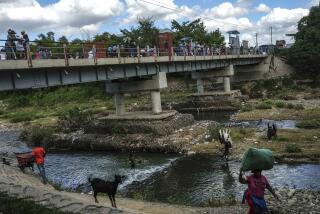Telephone Nation
- Share via
SANTO DOMINGO, Dominican Republic — Dominicans love to talk on the phone--more than most folks.
So much so, in fact, that the 540 million minutes of telephone time logged between the United States and the Dominican Republic last year made the country the eighth-largest talking partner with the U.S., ahead of such developed nations as Italy, South Korea and Israel.
And Dominicans talk longer than anyone else. This country of nearly 8 million people--with more than 1 million immigrants in the United States--leads the world in the average length of a long-distance chat with the U.S.
The problem, U.S. and Dominican telephone executives said, is that all too often no one pays for it.
If, for example, you tried to call the Dominican Republic’s 809 area code from Southern California this month, chances are you didn’t get through. Citing massive phone fraud in both the U.S. and the Dominican Republic, a Pacific Bell account executive in Los Angeles said the company blocked most calls to the island nation.
But even that loss has been a windfall for this country’s impetuous young telephone industry.
“The fraud has actually helped us, because we now have a very healthy market in the prepaid phone card business,” said Marcos Troncoso, chief executive of the Santo Domingo-based company Tricom, one of Latin America’s fastest-growing telecommunications concerns.
“You’ll see hundreds of phone centers in Dominican neighborhoods in New York and other U.S. cities. Most are using prepaid calling cards to get around the problems of nonpayment and fraud.
“In some cases, people can’t call from their houses because the line is blocked. In others, there are 10 or 15 people living in one house. And in others, their line was disconnected for nonpayment. So they use prepaid cards.”
The prepaid card business is so big, Troncoso said, that Tricom opened a U.S. subsidiary in New Jersey this year to handle the demand in the New York metropolitan area.
But fraud is hardly the only force driving the Dominican Republic’s freewheeling telephone industry, an emerging but somewhat wacky new market that has become so lucrative and competitive that one Western diplomat here called it “the Wild West of the global telecommunications industry.”
There’s also phone sex. Dozens of Dominican and U.S. companies have set up shop in this impoverished Caribbean land in the last few years, offering live, X-rated telephone chats worldwide--often to customers who have no clue that they’re calling Santo Domingo. Although they have no ownership interest in the tele-porn business, Dominican phone companies get a hefty share of the profits from all incoming long-distance calls.
Other key factors are behind the boom: a newly competitive telecommunications marketplace that was monopolized for decades by a single telephone company; a severe shortage of phone lines in the country; and the unique nature of the chatty Dominicans.
Tricom, a full-service telecommunications company that opened just five years ago to challenge the country’s giant Codatel, graphically illustrates the phenomenon.
In a Wall Street bond offering in August, Tricom issued $200 million in debt through Bear, Stearns & Co. in New York. The result: “It was so overwhelmingly oversubscribed, we just basically stopped taking orders,” said Bear, Stearns banker Joe Dempsey.
Tricom’s offering memorandum stressed the heavy Dominican telephone traffic with the United States, which grew by 30% in 1995 alone, and the need for more telephone lines in the country. The Dominican Republic has just 7.28 lines per 100 residents, compared with about 60 per 100 in the United States.
In the last five years alone, Tricom increased the number of Dominican lines by nearly 30,000, adding new residential and corporate connections. It also carved out 27% of the Dominican cellular phone market, with nearly 25,000 new subscribers here.
In a country where at least 90% of the population lives at or below the poverty line, Tricom is growing by plugging in to the island’s booming tourist and construction industries and mushrooming free-trade zones. But Troncoso said he also is targeting low-income families in rural areas that have been neglected by the country’s former monopoly.
“There’s a lot of potential there,” said a Wall Street emerging-markets analyst who asked to remain anonymous, adding, “One of the drivers of the telecommunications industry worldwide is pornography.”
“But generally speaking, there is a big Dominican population in the United States, and the Dominicans, like most Latin American cultures, are very family-oriented. They want to keep in touch with their friends and relatives.”
Emerging-markets analyst Pierre DuBois of Bear, Stearns said investors also were drawn to the Tricom bonds, which offered 11 3/8% annual interest, because it is a solid company--40% owned by Motorola and 60% by local investors--”in a country that now has a very favorable competitive environment for telecommunications.”
Here in the Dominican capital, at least part of Tricom’s sudden success lies in its competitive image.
“A lot of people here see us as the underdog” battling an uncaring giant, Troncoso said. Random interviews with Dominicans in the street supported his contention.
“I waited 10 years for a phone from Codatel, and these guys gave it to me in a few weeks,” said a taxi driver who identified himself only as Martinez. “Now, if only the electricity worked here.”
Meanwhile, locals say, Codatel’s service has improved dramatically since Tricom came along.
Despite Tricom’s successes, its state-of-the-art switching equipment has been known to crash because of Santo Domingo’s notoriously frequent power outages. In a country where growth has vastly outstripped infrastructure, the company is faced with laying new fiber-optic cable in places inaccessible by road.
“It’s in its early days,” analyst DuBois said. “The country still has a long way to go. But that’s what emerging markets are all about.”
(BEGIN TEXT OF INFOBOX / INFOGRAPHIC)
Look Who’s Talking
Despite its small population, the Dominican Republic has the eighth-largest call volume with the U.S.
A look at the top 10 nations for incoming and outgoing telephone traffic with the U.S. in 1996, in thousands of minutes: *--*
Rank Country Minutes, in thousands Population, in millions 1. Canada 6,308,281 29.1 2. Mexico 3,328,907 97.6 3. United Kingdom 1,999,417 58.6 4. Germany 1,094,542 84.1 5. Japan 1,040,603 125.7 6. France 645,641 58.5 7. Hong Kong 634,794 6.3 8. Dominican Republic 540,262 8.2 9. South Korea 537,046 46.0 10. India 473,929 967.6
*--*
Source: Federal Communications Commission
More to Read
Sign up for Essential California
The most important California stories and recommendations in your inbox every morning.
You may occasionally receive promotional content from the Los Angeles Times.













